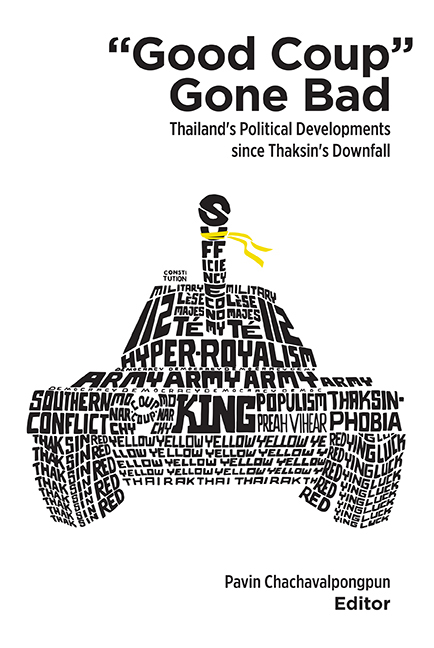Book contents
- Frontmatter
- Contents
- List of Tables and Figures
- Foreword
- Contributors
- Abbreviations
- Section I The 2006 Military Coup: Impact on the Thai Political Landscape
- Section II Defending the Old Political Consensus: The Military and the Monarchy
- 3 Broken Power: The Thai Military in the Aftermath of the 2006 Coup
- 4 The Monarchy and Anti-Monarchy: Two Elephants in the Room of Thai Politics and the State of Denial
- 5 Freedom and Silencing under the Neo-Absolutist Monarchy Regime in Thailand, 2006–2011
- Section III New Political Discourses and the Emergence of Yellows and Reds
- Section IV Crises of Legitimacy
- Index
- Plate Section
5 - Freedom and Silencing under the Neo-Absolutist Monarchy Regime in Thailand, 2006–2011
from Section II - Defending the Old Political Consensus: The Military and the Monarchy
Published online by Cambridge University Press: 21 October 2015
- Frontmatter
- Contents
- List of Tables and Figures
- Foreword
- Contributors
- Abbreviations
- Section I The 2006 Military Coup: Impact on the Thai Political Landscape
- Section II Defending the Old Political Consensus: The Military and the Monarchy
- 3 Broken Power: The Thai Military in the Aftermath of the 2006 Coup
- 4 The Monarchy and Anti-Monarchy: Two Elephants in the Room of Thai Politics and the State of Denial
- 5 Freedom and Silencing under the Neo-Absolutist Monarchy Regime in Thailand, 2006–2011
- Section III New Political Discourses and the Emergence of Yellows and Reds
- Section IV Crises of Legitimacy
- Index
- Plate Section
Summary
At first glance, one of the clearest indicators of the changes wrought by the 19 September 2006 coup in Thailand is the sharp decline in freedom of expression. In the five years since the coup, the number of lèse-majesté prosecutions has skyrocketed to heretofore unimaginable highs while the post-coup cyber control legislation — the Computer Crimes Act — has allowed the Thai government to erect a firewall almost as thick as that of China. By all international indices, freedom of expression and political freedom in general have declined in Thailand to such an extent that any claims by the Thai state of being democratic at all ring hollow indeed. While there is no question that the post-coup conditions in Thailand have further eroded constitutional or other legal protections of the right to freedom of expression, it might make more sense from a historical perspective to speak of the post-2006 Thai regimes as the culmination of a six-decade-long process that ironically has made Thailand into something more akin to absolute monarchies of the past or to the few more-or-less absolute monarchies of the present.
In this study, we will use “absolutism” as a jumping-off point for examining the results of the remarkable confluence of historical legacies stretching back the late 1940s with the partial restoration of the monarchy. This process was judicially legitimated by Supreme Court decisions of the 1950s, crystallized ideologically and resacralized under Sarit Thanarat in the early 1960s, and legally secured after 1976 with a toughened lèsemajesté law. For the next three decades, Thailand swayed to and fro, between democracy and authoritarianism, but lurching sharply towards the latter with the 2006 coup. Figure 5.1 gives some idea how the “normal” progression from absolute monarchy to democratic constitutional monarchy was arrested in 1958. In the last five years, this shift toward neo-absolutism culminated, transforming the appearance if not the essence of Thailand into a formation sharing more features with an absolute monarchy than with democratic constitutional monarchies.
- Type
- Chapter
- Information
- Good Coup Gone BadThailand's Political Development since Thaksin's Downfall, pp. 109 - 138Publisher: ISEAS–Yusof Ishak InstitutePrint publication year: 2014



